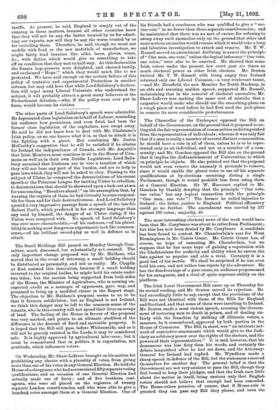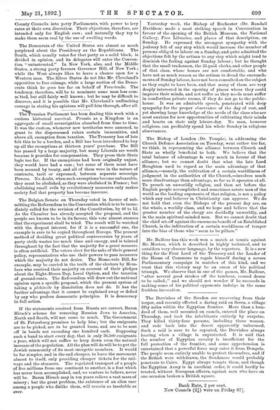The Irish Local Government Bill came up on Thursday for
its second reading, and Mr. Sexton moved its rejection. He had exceedingly little to say, except that the provisions of the Bill were not identical with those of the Bills for England and Scotland, and that some of them were insulting to Ireland. Mr. Sexton made a most violent speech, accusing the Govern- ment of torturing men to death in prison, and of dealing un- fairly with the franchise by striking off illiterate voters, a measure, be it remembered, approved by both parties in the House of Commons. The Bill, in short, was "an intricate net- work of restrictive enactments which would give to the Judi- ciary an arbitrary power over the rights of the electors, and the powers of their representatives." It is said, however, that his demeanour was less fiery than his words, and certainly the- debate languished after he had sat down, and the Attorney. General for Ireland had replied. Mr. Wyndham made a. sharp speech in defence of the Bill, but the statesmen reserved themselves for another day. The general belief is that the Government are not very anxious to pass the Bill, though they feel bound to keep their pledges, and that the Irish care little about the matter in itself, being anxious only that English voters should not believe that enough had been conceded. The Home-rulers perceive, of course, that if Home-rule is granted they can pass any Bill they please, and turn the
County Councils into petty Parliaments, with power to levy rates at their own discretion. Their objections, therefore, are intended only for English ears ; and naturally they try to make them seem real by the use of swelling words.



































 Previous page
Previous page